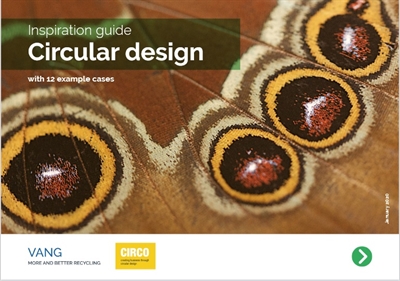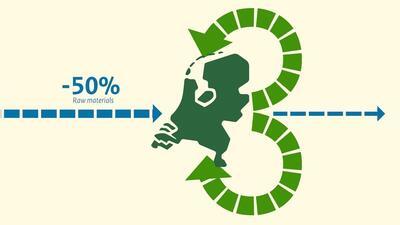Circular economy
Our ambition in the circular economy is to close the raw material cycles and bring a circular economy ever closer. From waste to resources.
We actively make the knowledge and expertise we have accumulated available within Rijkswaterstaat as well as to target groups in the market. The information is distributed to public authorities and social organisations through events, to our Waste Management Helpdesk and on various websites and social media. We take part in the nationwide Circular Economy programme, including the From Waste to Raw Materials programme, which promotes the avoidance and recycling of waste by municipalities and businesses.
Procurement
By conducting a series of pilots we are learning more and more about what needs to be done to make the shift to circular procurement. These insights are being used to improve our own procurement processes. We are also applying the knowledge we gain in new pilots outside Rijkswaterstaat and encourage participants to pass on their knowledge. Example of a procurement project is the REBus project.
In the Circular Public Procurement project in the Baltic Sea Region, partners from Denmark, Sweden, Finland, Latvia, Poland, Russia and the Netherlands are working to develop the market for circular products and services through government procurement.
Circular design
Preservation of the value of materials and products is the central challenge for a circular economy. It requires a different way of designing and using products and collaboration in the production chain. To achieve this, new design strategies that focus on long product life, sustainable choice of materials and closing the material chain are crucial.
Download the Inspiration guide Circular design, with 12 example cases (pdf, 3 MB)

Three strategies:
- Design strategy 1: Focus on long lifespan.
- Design strategy 2: Close the loop.
- Design strategy 3: Choose sustainable materials.
The animation shows these important design strategies in practice.

New Online Course Design for Recycling of Electronics
Optimize the Recyclability of Your Products
In a circular economy products are designed to last. Yet every product will eventually reach the end of its functional life. Recycling can help recover the value embedded in its materials so that these can be used again to manufacture new products. However, for complex products – such as electronics – applying this seemingly simple principle can present big challenges.
This brand new course brings you the latest developments in both Design for Recycling and Designing with Recycled plastics. It will examine inspiring examples and provide insight into current and future recycling technologies, legislation and business models.
Is this course for you?
This course supports designers, engineers and decision makers in the Electrical and Electronic Equipment (EEE) industry in making the transition towards a circular economy. Regardless of your level of design experience or your familiarity of the circular economy, this course will help you to either upskill or update your knowledge and improve your product design and materials selection.
Enroll for Free – Starts November 10, 2021
Optimize your designs
You will learn how the recyclability of EEE products can be optimized through good design and how to utilize recycled plastics in existing or new products using new methods. Our case studies will demonstrate how Design for Recycling can be applied to your own designs.
Enroll for Free – Starts November 10, 2021
This course is an initiative from the Delft University of Technology, Partners for Innovation, Rijkswaterstaat and frontrunners within the EEE industry from the RE-CET (Redesigning Electronics in a Circular Economy Transition) consortium.
New Online Course Design for Recycling of Electronics
Enroll on a brand new and free course that brings you the latest developments in both Design for Recycling and Designing with Recycled plastics!
Sustainable Public Procurement
The global demand for raw materials such as food, electrical devices and clothes is on the rise. In an effort to manage raw materials more intelligently, the government is working together with the business community, research institutes and other institutions specialised in various disciplines.
